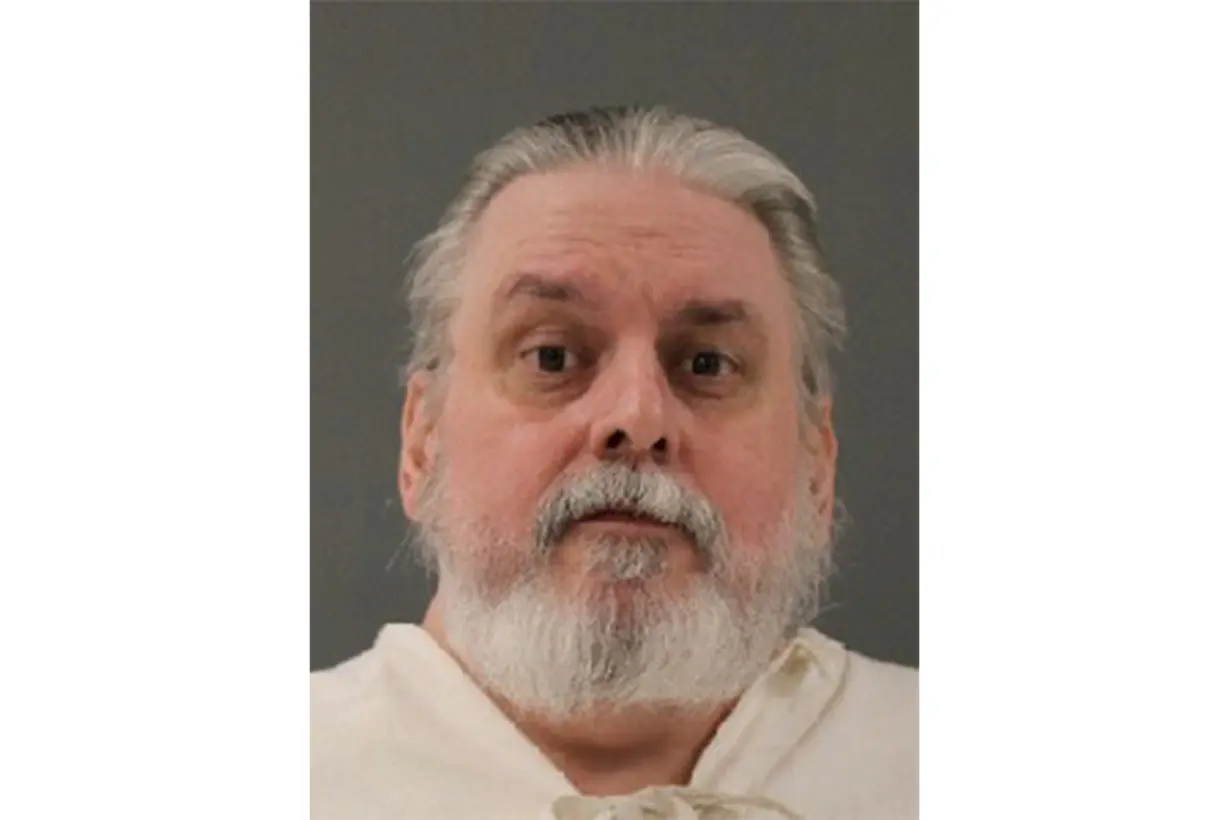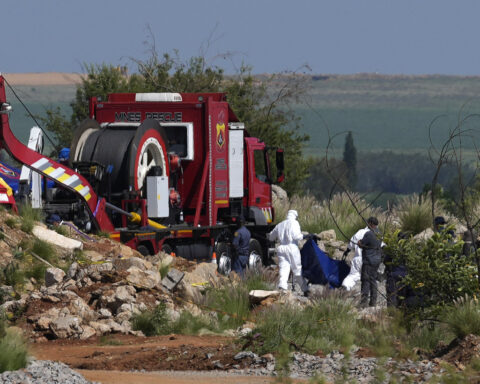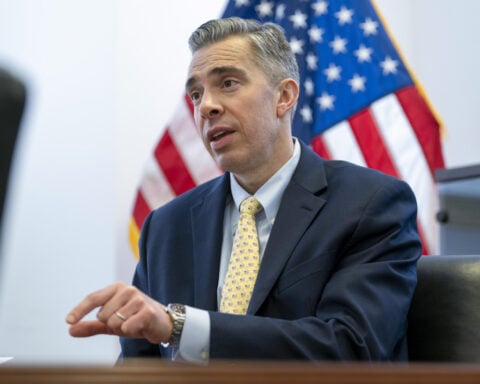HUNTSVILLE, Texas (AP) — A Texas man who said his death sentence was based on false and unscientific expert testimony was executed Thursday evening for killing a man during a robbery decades ago.
Brent Ray Brewer, 53, died by chemical injection at the state penitentiary in Huntsville for the April 1990 death of Robert Laminack. He was pronounced dead at 6:39 p.m. local time, 15 minutes after a lethal dose of pentobarbital began flowing into his arms.
Prosecutors had said Laminack, 66, gave Brewer and his girlfriend a ride to a Salvation Army location in Amarillo when he was stabbed in the neck and robbed of $140.
After a spiritual adviser standing next to Brewer in the death chamber said a brief prayer, and Brewer responded, “Amen,” the inmate told the warden also next to him that he wanted to make a final statement.

“I would like to tell the family of the victim that I could never figure out the words to fix what I have broken,” he said as members of the Laminack family quietly watched through a window just feet from him.
“I just want you to know that this 53-year-old is not the same reckless 19-year-old kid from 1990,” he continued, his voice cracking. “I hope you find peace, and I mean it.”
As the drugs took effect, he gasped twice, snored several times and then took a few quiet breaths. Within 30 seconds, all movement stopped.
“Brent Ray Brewer was in prison more than 33 years,” Debra Corbin, whose father was killed in the attack, said after watching Brewer die. "Our mom says our family has been in prison 33 years.
“We have been released today.”
The execution came hours after the U.S. Supreme Court declined to step in over the inmate's claims that prosecutors had relied on false and discredited expert testimony at his 2009 resentencing trial. Brewer’s lawyers had alleged that a prosecution expert, Richard Coons, falsely claimed Brewer would be a future danger — a legal finding needed to impose a death sentence.
The Texas Court of Criminal Appeals on Tuesday had dismissed an appeal on that issue without reviewing the merits of the argument, saying the claim should have been raised previously.
“We are deeply disturbed that the (appeals court) refuses to address the injustice of allowing Brent Brewer to be executed without an opportunity to challenge Dr. Coon’s false and unscientific testimony,” one of Brewer's attorneys, Shawn Nolan, said afterward.
The Texas Board of Pardons and Paroles on Tuesday voted 7-0 against commuting Brewer’s death sentence to a lesser penalty. Members also rejected granting a six-month reprieve.
Brewer had said he has been a model prisoner with no history of violence and has tried to become a better person by participating in a faith-based program for death row inmates. And he had long expressed remorse for the killing and a desire to apologize to Laminack’s family.
In 1990, Brewer and his girlfriend had first approached Laminack outside his Amarillo flooring store before attacking him, prosecutors had said.
Laminack’s son took over his father’s business, which was started in 1950, and has continued to run it with other family members.
Brewer was convicted of capital murder and sentenced to death in 1991. But in 2007, the U.S. Supreme Court overturned the death sentences Brewer and two other Texas inmates had received after ruling the juries in their cases did not have proper instructions when they decided the men should be executed.
The high court found jurors were not allowed to give sufficient weight to factors that might cause them to impose a life sentence rather than death. Brewer was abused as a child and suffered from mental illness, factors jurors were not allowed to consider, his lawyers argued.
Brewer was again sentenced to death during a new punishment trial in 2009.
Brewer’s lawyers allege that at the resentencing trial, Coons lied and declared, without any scientific basis, that Brewer had no conscience and would be a future danger, even though Brewer did not have a history of violence while in prison.
In a 2010 ruling in the case of another death row inmate, the Texas Court of Criminal Appeals called Coon’s testimony about future dangerousness “insufficiently reliable” and that he should not have been allowed to testify.
Randall County District Attorney Robert Love, whose office prosecuted Brewer, denied in court documents that prosecutors presented false testimony on whether Brewer would be a future danger and suggested Coon’s testimony “was not material to the jury’s verdict.”
Brewer is the seventh inmate in Texas and the 21st in the U.S. put to death this year.
___
Lozano reported from Houston.
___
Follow Juan A. Lozano on X, formerly Twitter: https://twitter.com/juanlozano70

 Insurance for natural disasters is failing homeowners − I don’t have the answers, but I do know the right questions to ask
Insurance for natural disasters is failing homeowners − I don’t have the answers, but I do know the right questions to ask
 Joe Biden’s record on science and tech: Investments and regulation for vaccines, broadband, microchips and AI
Joe Biden’s record on science and tech: Investments and regulation for vaccines, broadband, microchips and AI
 Meta shift from fact-checking to crowdsourcing spotlights competing approaches in fight against misinformation and hate speech
Meta shift from fact-checking to crowdsourcing spotlights competing approaches in fight against misinformation and hate speech
 In eyeing Greenland, Trump is echoing long-held American designs on the Arctic expanse
In eyeing Greenland, Trump is echoing long-held American designs on the Arctic expanse
 South Africa tried to pressure informal gold miners by cutting off food. Now it's pulling out bodies
South Africa tried to pressure informal gold miners by cutting off food. Now it's pulling out bodies
 Poland's leader accuses Russia of planning acts of sabotage against 'airlines around the world'
Poland's leader accuses Russia of planning acts of sabotage against 'airlines around the world'
 Jayden Daniels accomplishes a feat last done by Slinging Sammy Baugh in 1937
Jayden Daniels accomplishes a feat last done by Slinging Sammy Baugh in 1937
 Wildfires latest: A final round of dangerous fire weather and dry conditions is in the forecast
Wildfires latest: A final round of dangerous fire weather and dry conditions is in the forecast
 Kamala Harris memes questioning her cultural background highlight Americans’ contradictions with race
Kamala Harris memes questioning her cultural background highlight Americans’ contradictions with race







